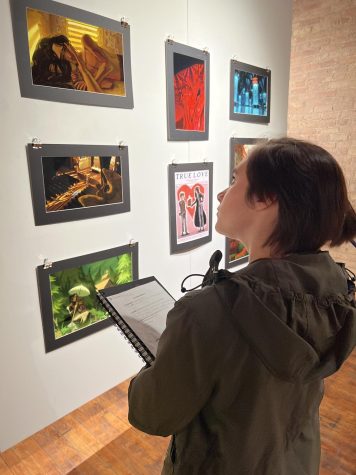When social media, Wall Street Clash: Students, staff reflect on January’s stock market short squeeze
March 7, 2021
The internet was buzzing over a stock market short squeeze in late January after Reddit users sparked a movement that would shift power away from Wall Street toward the common investor.
“A Redditor on r/WallStreetBets discovered that a hedge fund bought a large amount of ‘short’ stocks in GameStop,” Personal Finance Teacher Rahul Sethna said. “Shorting a stock basically means when a trader borrows stock from a broker and immediately sells it at the current price. The short seller is betting that the stock price will fall for various reasons, so when they buy back the stock to return to the broker, they are buying it at a lower price. They make a profit out of the difference of the original price at which they sold the stock and the price at which they bought it back.”
The user convinced followers of the thread to buy the stock in order to make the stock skyrocket in value– this was the catalyst of a frenzy that transcended Reddit itself.
“[The stock] ended up rising more than 300 percent,” Sethna said. “Because the price kept rising, the hedge fund had to ‘cover’ its position and buy back the stock at an elevated price, which made the price rise even further as there was more interest in the stock. Technically, it’s called a short squeeze. The Redditors priced the hedge fund out of its own short position, and they went bankrupt.”
Investors were purchasing not only GameStop, but other often shorted stocks from companies, such as AMC Theatres and Nokia Corporation.
Senior Jeffrey Weiss had only limited involvement in trading when he decided to get in on the action and “learned alot” from the experience.
“What made me get involved is that I saw how much impact that these everyday people were having on these large hedge funds that have been running Wall Street for what seems like forever,” Weiss said.
TikTok played a large role in extending the conversation about the market conditions to a broader audience with videos explaining the situation gaining high traction on the app.
According to a Jan. 28 Business Insider article titled “Teens are swarming TikTok to talk about how to start investing thanks to the GameStop frenzy” by Grace Kay, the #investing had reached 1.5 billion views and #gamestop reached 380 million views as of Jan. 28– they have both continued growing since.
Trading Platform Robinhood was a popular choice for new investors to buy into the ballooning market, and they saw immense growth during this period as a result.
“Robinhood, the trading platform app, has democratized investing and allowed armchair investors the ability to use trading instruments that were only available to high-level Wall Street analysts,” Sethna said. “The common person now has a seat at the table.”
As a result of the nearly unprecedented market volatility, Robinhood decided to suspend trading of some of these stocks. In a Jan. 28 blog post, the company explained that they had to make these restrictions to meet financial requirements they were obligated to uphold.
“As a brokerage firm, we have many financial requirements, including SEC net capital obligations and clearinghouse deposits,” Robinhood said in the Jan. 28 blog post titled “An Update on Market Volatility.” “Some of these requirements fluctuate based on volatility in the markets and can be substantial in the current environment. These requirements exist to protect investors and the markets, and we take our responsibilities to comply with them seriously, including through the measures we have taken today.”
Robinhood’s decision sparked discussion about prevailing biases in the financial industry, as many saw the decision to freeze trading as a way to keep the previously mentioned hedge funds afloat– at the expense of the ametuer investor.
Vlad Tenev, Robinhood CEO, testified on Feb. 18, at a congressional hearing to defend the company’s decision. He denied allegations that the company had made these moves to help protect the hedge funds that had shorted the stocks.
“Robinhood Securities put the restrictions in place in an effort to meet the increased regulatory deposit requirements, not to help the hedge funds,” Tenev said at the hearing. “We do not answer to hedge funds. We serve the millions of small investors who use our platform every day to invest.”
The hearing also opened up discussion regarding the protection of investors and providing the customer support necessary to ensure safety during turbulent market events.
The short squeeze has been a learning opportunity for many– it has revealed not only the benefits of getting involved with the stock market but also the risks.
“We teach students to invest for the long term using the time value of money to increase their wealth over a longer period of time,” Sethna said. “In trading, for the common person, it is akin to gambling, and there are not enough safeguards to stop unknowledgeable investors from losing a lot of money.”


